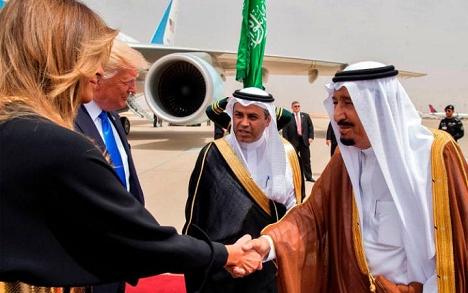by WorldTribune Staff, May 22, 2017
A public overture by the Saudi king to the U.S. president’s wife “signaled that the restrictions declared by the Wahhabi clergy are no longer the ultimate arbiter of personal behavior,” in Saudi Arabia, said an analysis of the president’s Middle East trip and his much-heralded deal with the kingdom.
“President Trump’s spectacular reception in Riyadh is a signal to the world (and to Saudi subjects, in particular) that big changes are coming,” Thomas Lifson wrote for American Thinker.

“Elderly and frail King Salman ventured out onto the apron in 110-degree heat and actually shook Melania Trump’s hand as she deplaned Air Force One, thereby touching a female infidel.
“Perhaps even more important in terms of Saudi daily life, the women in attendance at functions did not wear head coverings and abayas. The entire nation saw this on television and understands that the fracking-created global oil glut changes everything, that the infidels no longer cower in fear of a cutoff of the oil Allah granted to the protectors of the holy cities of Mecca and Medina. The old arguments of the fanatics hold less water.”
The king’s handshake gesture “can seem trivial, quaint, or even humorous to Americans, but it is very serious business. The role modeling of the women at the highest and most formal level reaches deep into the culture,” Lifson wrote.
“It is now clear that the king and his two designated successors (Crown Prince Muhammad bin Nyef and Mohammad bin Salman) have made a deal to liberalize Saudi Arabia. The deal-maker president has told them that there is a price of continued American support.”
Saudi had already agreed to a deal to reward Trump with a massive arms purchase worth $109.7 billion.
But, Lifson noted, this aspect of the deal, from The New York Times, is important:
“On the afternoon of May 1, President Trump’s son-in-law, Jared Kushner, welcomed a high-level delegation of Saudis to a gilded reception room next door to the White House and delivered a brisk pep talk: ‘Let’s get this done today.’
“Mr. Kushner was referring to a $100 billion-plus arms deal that the administration hoped to seal with Saudi Arabia in time to announce it during Mr. Trump’s visit to the kingdom this weekend. The two sides discussed a shopping list that included planes, ships and precision-guided bombs. Then an American official raised the idea of the Saudis’ buying a sophisticated radar system designed to shoot down ballistic missiles.
“Sensing that the cost might be a problem, several administration officials said, Mr. Kushner picked up the phone and called Marillyn A. Hewson – the chief executive of Lockheed Martin, which makes the radar system – and asked her whether she could cut the price. As his guests watched slack-jawed, Ms. Hewson told him she would look into it, officials said.
“Mr. Kushner’s personal intervention in the arms sale is further evidence of the Trump White House’s readiness to dispense with custom in favor of informal, hands-on deal making. It also offers a window into how the administration hopes to change America’s position in the Middle East, emphasizing hard power and haggling over traditional diplomacy.”
Lifson said it was a “tangible and personal signal to the factions of the Saudi family represented in the high-level delegation. An Orthodox Jew, married to the favored child of the president (who became a Jew herself), saved them money using his personal connections.”
“You have to see this against the background of the sudden new confluence of interests between Israel and Saudi Arabia, united in opposition to Iran and Arab radical Islamic terrorists. The two nations already covertly cooperate, a ruse that cannot last forever. Slowly and surely, the Saudis have to turn away from the Palestinians and toward an embrace of Israel. And it turns out that there can be a considerable upside to making peace with Israel and the Jews.”
So, Lifson asked, how do the Saudis demonstrate to Trump, the world, and their own subjects that things are changing, and that it is acceptable?
“My guess is that a symbolic measure that does not affect anyone in Saudi Arabia will be the next step. An easy one would be to end the prohibition against Israeli civilian airliners flying over Saudi airspace when flying eastward toward India, Thailand, and beyond. Israel’s economic and tourism ties with Asia are large and growing, so this restriction, which adds hours and costs, is an irritant to Israelis, as well as a political statement to the world that Israel is illegitimate.
“The fact is that President Trump’s planned nonstop Air Force One flight from Riyadh and Ben Gurion Airport in Israel will be the first publicly known flight between the two nations. (There is a decent chance that secret flights have taken place because the governments do talk to each other covertly.) So Trump is already liberalizing their aviation restrictions.”
Lifson continued: “Allowing Israeli airliners to fly over Saudi territory would be a good first step toward eventual direct flights, a sign of complete acceptance of Israel as a legitimate nation, which is the only long-term solution to peace between Arabs and Jews in the Middle East. It is a long path, but there is no alternative to a step at a time, given the delicate political situation of the Saudi royals.
“It is clear to me that President Trump has made a transformational deal, and that the West has a stake in helping it come to fruition.”
